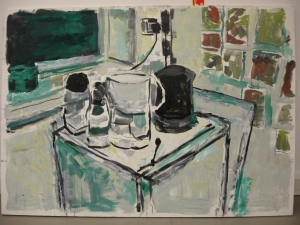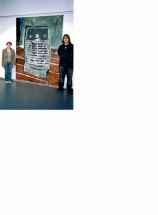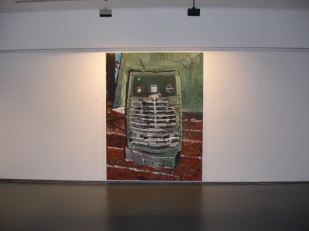Being a mother is a struggle between wanting to care for your children, whilst at the same time, trying to preserve your own identity and continuing to develop as a person. Many people, including my parents, have thought, wrongly, that an education for a woman is a waste of resources. How can that be? An educated mother is more likely to pass on good principles to her children than an uneducated mother. Well, I think so, at least.
With this at the back of my mind, I had been hankering after a university education for some years, and when my children were approaching school age, I began to look into this. My inquiries into re-sitting my exams mostly resulted in negative replies, due to the fact that I was over 21, and I was unable to obtain a university place due to my poor performance at school. However, a local college accepted me onto their daytime German Advanced Level course, which I passed the following year.
After some further evening courses in German over several years, I was finally accepted onto a modern languages degree course.
I had been given two interviews, one at the local university and another at Manchester. The Head of Department of Salford, was interested in my application, but expressed some serious reservations on how I might cope with studying, being a mother of teenagers. The view at that time was that women should have equal opportunities with men, and I thought that too.
I accepted the offer from Manchester University as it was a course based on German literature. However, as I was unable to fulfill the residency condition of a year in Germany, due to having a family, I was, therefore, enrolled onto a double degree with Spanish, which had a compulsory attendance requirement of at least a month in each country.
I worked hard at my studies, and, after two years it was time to leave for my month’s stay in Germany. I had chosen to take two courses, rather than just spend time on vacation. There were no set rules. I discovered later that one languages student had spent his entire free time in an Austrian bar, having learned only the local dialect, and no doubt the names of all the local beers,
Due to my age, by this time, I found it slightly more difficult to make friends, as most students were quite young, but managed to find a few companions. In Jena, in the former East Germany, I became acquainted with a Japanese woman and an elderly Englishman, who other students often mistook for my husband, and in Bamberg, in the west, I met a young Italian woman, who spoke no English, and so we communicated only in German.
My family came to visit me in the second part of my stay, and we spent a weekend together. My husband said all was going well at home, and that some of my boys’ friends were helping with preparations to decorate our hall and stairs. This sounded wonderful, though quite unusual and I wondered how they had been persuaded to help. It was rather a mystery.
My courses came to an end and I returned home via a University friend’s apartment in Heidelberg. As a divorcée, she was staying for the whole year with her children. I was travelling by train and could stop off quite easily. We spent a weekend together, but while I was there, I phoned home to some disturbing news. My husband had discovered a bong in the wardrobe!
On my return, I had a discussion with my sons, who naturally blamed everything on the young lads who had been helping with the decorating. Apparently, these lads had been entering the house during school lunch breaks in term-time, and using my attic room to prepare their blocks of cannabis for sale to the other pupils. As an incentive to use this room, my boys were given samples for their own use. During my stay in Germany that summer this activity had continued under cover of helping my husband out. He had absolutely no idea what was going on until the bong episode.
I went into school at the earliest opportunity to complain about those other pupils who had been abusing my home. I had all their names and information on what they had been doing. I also had the offending bong in a black plastic sack. The deputy Headmaster invited me into his room and I sat perched upon a low seat. My youngest son was sent for and questioned by a representative of the local drugs squad. It turned out that my eldest son, who was at the local college, had been constructing the bongs to order, from central heating pipe off-cuts which he had found in the cellar. I actually fell off the seat when I heard. We were then asked to make a statement about the whole incident and submit it to the police.
On the local radio news the next day, we heard that two pupils, but not the main supplier, had been suspended from school.
We received several visits from well-built pupils wanting to enter our home, who tried pushing past me, as I am quite small. I wasn’t about to allow them to enter, however. We, therefore, tightened up on security by locking the outer door to the house.
It was during the following school term that my youngest son became psychotic.






